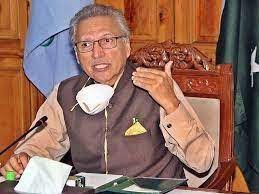President Arif Alvi has called for economic and financial empowerment, property rights, health and nutrition, coupled with quality education and skills and a harassment-free workplace to motivate the women who make up almost 50 per cent of the population to play their due and active role in business, trade, and services sectors of the country.
The president expressed these views while addressing the launching ceremony of the Federal Ombudsperson Secretariat for Protection against Harassment (FOSPAH)’s Annual Report, launched in coordination with the UN Women, at Aiwan-e-Sadr on Friday.
The president expressed his solidarity with flood victims around the country and expressed his condolences and offered prayers for those who had lost their lives during devastating floods. The participants also observed one minute of silence in solidarity with the flood victims.
Federal Ombudsperson for Protection against Harassment Kashmala Khan, UN Women’s Country’s Representative in Pakistan Sharmila Rasool, and Country Director of United Institute of Peace (USIP), Pakistan Adnan Rafiq, also addressed the occasion.
Members of the diplomatic community, media persons and women from different walks of life attended the ceremony. The president, along with Kashmala Khan and other speakers launched the Annual Report of FOSPAH.
Addressing the ceremony, the president said that our social and cultural attitudes and intellectual biases toward women’s rights, their economic and financial empowerment and gainful employment, and our moral and ethical values needed correction on the basis of Islamic teachings which called for equal education opportunities for both man and women and allowed women to seek gainful employment by following Hazrat Khadija (RA) as a role model who was a successful businesswoman.
The president said that women’s inclusion in the economy could be enhanced by improving their mobility and providing them equal opportunities in the business, trade and services sectors and creating a safe and secure work environment to enable them to realise their fullest potential and by taking affirmative action wherever necessary.
He said that in Pakistan, only 24 percent of women were working in the formal and informal sectors of the economy which was very low compared to men whose economic participation was around 90 percent. He said that no country can make meaningful socio-economic progress without the full participation of women in the economy.
He further said that women should be treated as equal citizens as ordained in Islam and in the Constitution of Pakistan. He said that the practice of women voluntarily resigning from their property rights in favour of their male family members should be discouraged to stop the exploitation of women’s rights on inherited properties.
The president said that over 80 percent of the admission taken in professional colleges were by women but their retention in gainful employment was very low due to social and domestic constraints. This trend, he said, needed to be reversed on a priority basis through collective action by the government, families and women themselves.
He also called upon the industrial and services sectors to create a harassment-free work environment in their establishments where their own women family members and their women employees could contribute their share in creating wealth for their company and for the country.
The president appreciated the Federal Ombudsperson for taking concrete steps for the expansion of its offices to Peshawar, Karachi, and Lahore to provide relief to women complainants at their doorstep. He also commended the Federal Ombudsperson for its hard work, commitment and introducing IT-based solutions for filing appeals, taking statements and recording evidence, which had increased the number of 500 cases filed from 2010-2018 to 5,000 cases from 2018-2022.
The president advised FOSPAH to continue its efforts and improve upon it to create awareness in the society on the importance of women’s education and their economic role in society and to encourage them to approach Women Ombudsperson for resolution of their issues relating to property rights and workplace harassment.
Earlier, Kashmala addressed the ceremony and highlighted that FOSPAH was an autonomous quasi-judicial body that provided justice to aggrieved persons in cases involving harassment at the workplace and denial of property rights to women within 60 days.
She said that the establishment of a women-specific institution was indicative of the state’s resolve toward protecting women’s rights and ensuring their participation in the workforce.
Sharmila in her address said that enhancing women’s participation in the workforce would help improve Pakistan’s economy, besides helping it achieve the Sustainable Development Goals.
Adnan highlighted that members of society needed to be more sensitive to the difficulties faced by women during their movement and while performing their duties in the workplace
Source: Business Recorder






